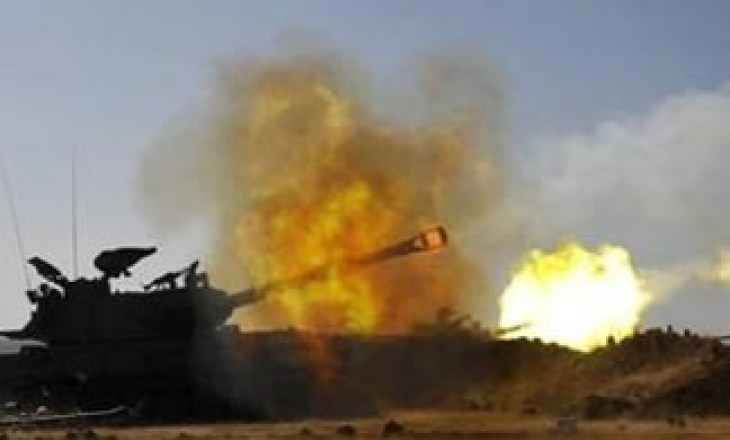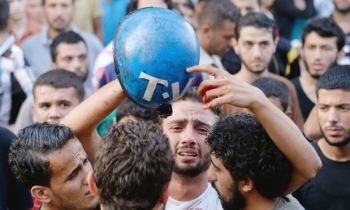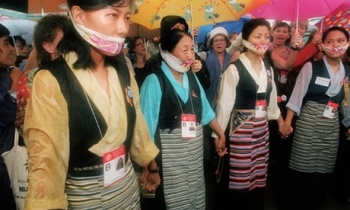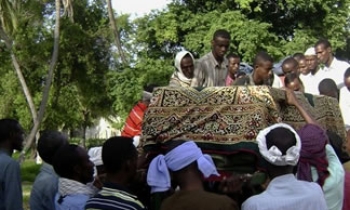International press freedom groups have urged the Israeli military to put an end to targetting Palestinian media in the Gaza Strip and allow international journalists to enter the region to cover the conflict.
On Monday, the eighth day of its military campaign, the Israel Defence Forces (IDF) fired two missiles into the offices of the Hamas-affiliated Al-Risala newsweekly, according to multiple regional news agencies, including Al-Quds Press and the Kuwaiti News Agency. The attack destroyed all of the paper's equipment and nearly all the furniture in the headquarters of the newspaper, which is located in a residential building in a densely populated area of Gaza City, Editor-in-Chief Wissam Afifa told the New York-based Committee to Protect Journalists (CPJ).
No employees were killed or injured in the attack, which took place at night, although other residents of the building received superficial shrapnel wounds, said Afifa, adding that structural damage forced the residents of the building to abandon it.
Within minutes of that bombing, the IDF also bombed al-Rantisi printers, the commercial printing press that publishes Al-Risala, according to local news reports. There were no casualties in that attack either; the printing press was not in operation at the time. The newspaper has not appeared on newsstands since December 30 because the staff has been unable to get to work due to the fighting, according to Afifa.
CPJ's calls and emails to Israeli military spokeswoman Major Avital Leibovich and the IDF North America Desk for comment were not immediately returned.
The IDF also continued to sporadically take over the frequencies of Gaza-based Sawt al-Sha`b radio and Al-Aqsa television, with Israeli military propaganda calling on Palestinians to abandon Hamas, according to Agence France-Presse (AFP) and local news reports.
According to the English-language service of Al-Jazeera, one of its crews was detained for hours on January 3 in Kissufim, a border-crossing area between Israel and Gaza, and its footage was confiscated because they were "filming in a closed military zone," Al-Jazeera reported.
"International law provides unambiguous protections for journalists, even during military operations, and media installations can only be targeted if they serve a military function," said CPJ Executive Director Joel Simon. "We call on the IDF to cease the targeting of Palestinian media in Gaza."
"Each day that passes we see cynical violations of press freedom and the rights of journalists trying desperately to cover the tragic events unfolding in Gaza," said Aidan White, International Federation of Journalists (IFJ) General Secretary. "We have reports that media inside Gaza are being targeted by Israeli soldiers while those outside are being kept at bay."
On January 5, a compromise reached between the authorities and the Jerusalem-based Foreign Press Association to allow a selected group of foreign journalists into Gaza was withdrawn, overruling an Israeli court order in favour of opening the blockade of the area to give media access. IFJ says that any arrangement to allow access should not be controlled by the Israeli military.
"The continued ban on journalists travelling into Gaza to cover the conflict is outrageous, particularly given that the courts in Israel have said they should be allowed in," said White. "But reports of targeting those who are on the spot add to our concern that there is a policy in place to deny access to the full story and to intimidate reporters that are already there."
Reports from the Palestine Journalists Syndicate (PJS) in Gaza said that on Sunday a utility vehicle bearing "TV" and "Press" markings" from Al Aqsa TV was clearly targetted.
On December 27, Israel declared large swaths of Gaza as well as a 2-mile (3.2km) strip along all of Gaza's boundaries to be closed military zones. This decision came after a September 2008 ministry of defence order banning foreign reporters from entering Gaza. The ban, enforced sporadically in the last two months, as well as an existing two-year-old ban by the government on Israeli journalists reporting from Gaza, effectively prevents journalists from reporting on the continuing military operations in the area. Despite a January 2 decision by the Israeli Supreme Court calling for eight foreign journalists to be granted entry into the Gaza Strip, the Defense Ministry continues to prevent them from entering the territory.
"To grant permission to merely eight journalists out of a 400-plus-strong media corps in Israel to enter Gaza is inadequate," said Simon. "There is serious news being made in Gaza, and only a small number of local journalists to cover it."
On December 29, the IDF shelled the headquarters of Al-Aqsa television, destroying it entirely. The station continues to broadcast from a remote location.
In a letter to Israel Defence Minister Ehud Barak last week, CPJ demanded an explanation for the targeting of Al-Aqsa and called on Israel to lift restrictions it has placed on the entry and movement of journalists in Gaza and southern Israel. CPJ has not yet received a response.










